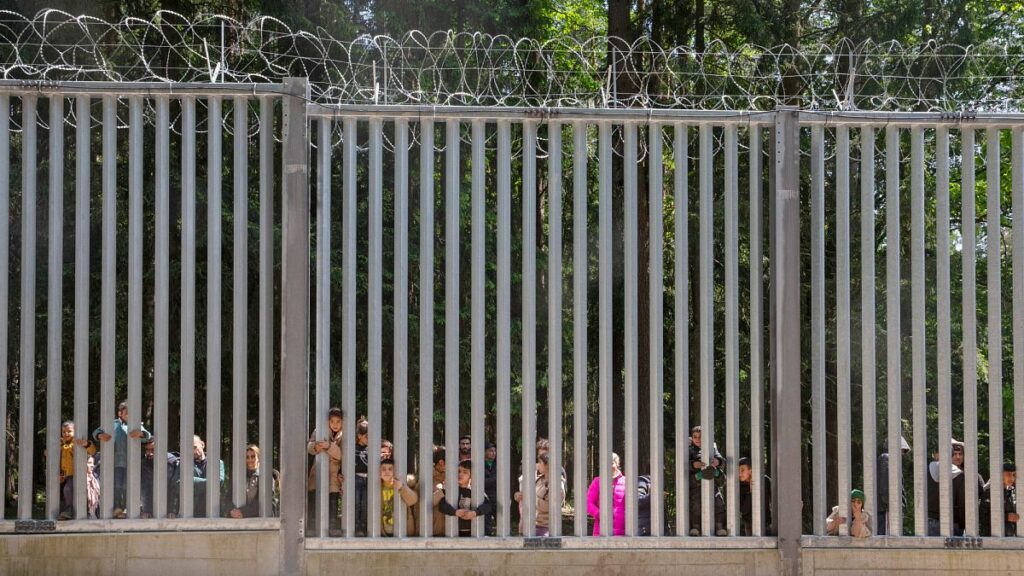EU home affairs ministers meeting in Copenhagen on Tuesday have broadly endorsed two recent controversial proposals by the European Commission designed to curb irregular migration into the bloc.
These proposals – dubbed ‘innovative solutions’ by the Commission – involve outsourcing to third countries asylum seekers and migrants whose claims have been rejected.
“We need to make innovative solutions and new agreements with countries outside of the European Union”, said Kaare Dybvad Bek, Minister for Immigration and Integration of Denmark, which is currently chairing the EU. “I’ve had good discussions with colleagues, a lot of similar opinions across the table, and I hope that we can make some progress in the coming six months.”
A UK-Rwanda style policy
By changing the EU definition of “safe third countries”, member states would be allowed to dismiss asylum applications without consideration, and transfer applicants overseas, even if the migrant has no connection to the place in question.
A “safe third country” is a non-EU country where a person seeking international protection is treated according to “international standards”, and safeguards include the protection of asylum seekers from persecution and serious harm, the respect of the principle of non-refoulement, and the possibility to have access to a functioning asylum system.
Under the Commission’s proposal, no form of connection between the third country and the applicant meant to be transferred there is required. The change could therefore result in partnership with non-EU countries, similar to the UK’s Rwanda deportation policy, which was ruled unlawful by the UK’s Supreme Court.
Previously considered taboo, many countries have now come around to the idea, according to the Danish Minister for Immigration.
“A lot of member states changed their position in these areas. I remember when I was a new minister in this Council three years ago, it was a bit uphill, I think, to try to introduce innovative solutions. […] Now we see there’s been a lot of countries that changed their position either because they changed their mind or because there’s a new government,” said Dybvad Bek.
While most countries seem to agree with the proposal, more opposition is expected from the European Parliament, with Socialists and democrats, Greens/EFA and The Left group traditionally against stricter rules on migration.
Return hubs gaining traction
The other innovative idea, enshrined in the return regulation, would enable member states to transfer rejected asylum seekers to “return hubs” outside the EU, while completing the paperwork to get them returned to their countries of origin.
The Commission’s proposal does not foresee an EU-wide programme to build these deportation centres, but it lays the necessary legal groundwork to allow governments to strike arrangements with countries outside the bloc that might be willing to host migrants in return for financial incentives.
Two centres built in Albania by the Italian government, initially meant to host asylum seekers, have been converted into return centres and could serve as a model.
Other countries could follow suit with similar schemes, as suggested by French Interior Minister Bruno Retailleau.
“France has constitutional obstacles [on some measures], but we don’t have any on return centres. And I’m in favour of anything that makes returns more efficient.”
Migration is a priority for Denmark, which would probably push the Commission’s proposals forward, especially the return regulation: “We hope to reach a general agreement on return policy within our presidency,” the Danish Minister said.
The Commissioner for Internal Affairs and Migration Magnus Brunner considered Denmark “very aligned” with the Commission’s agenda over the next six months. He declined to pin a concrete target on the effective return rate of rejected migrants from EU countries, to be reached after the approval of the return regulation.
Many countries seem to be on board with the Commission’s proposals. Austria, Germany, France, the Czech Republic, and Poland recently signed a common declaration to beef up migrant returns, strengthen external borders, and build partnerships with third countries.
Read the full article here

